Business Law Report: Legal Systems, Legislation and Businesses
VerifiedAdded on 2021/02/19
|14
|4293
|22
Report
AI Summary
This report provides a comprehensive overview of business law in the UK, encompassing the nature of legal systems and legislation impacting businesses. It explores the meaning of 'parliamentary sovereignty' and the sources of UK law, including case law, legislation, and EU directives. The report details the government's role in law-making, differentiating between executive, legislative, and judicial functions, and explains the application of statutory and common law. Furthermore, it analyzes the impact of company, employment, and contract law on business operations, distinguishing between legislation, regulations, and standards. The report also discusses various types of business organizations, focusing on limited companies, and contrasts unincorporated and incorporated businesses, along with their respective advantages and disadvantages. Finally, the report explores legal dispute resolution methods, applying them to two case studies and addressing the implications of converting a partnership into a limited company.
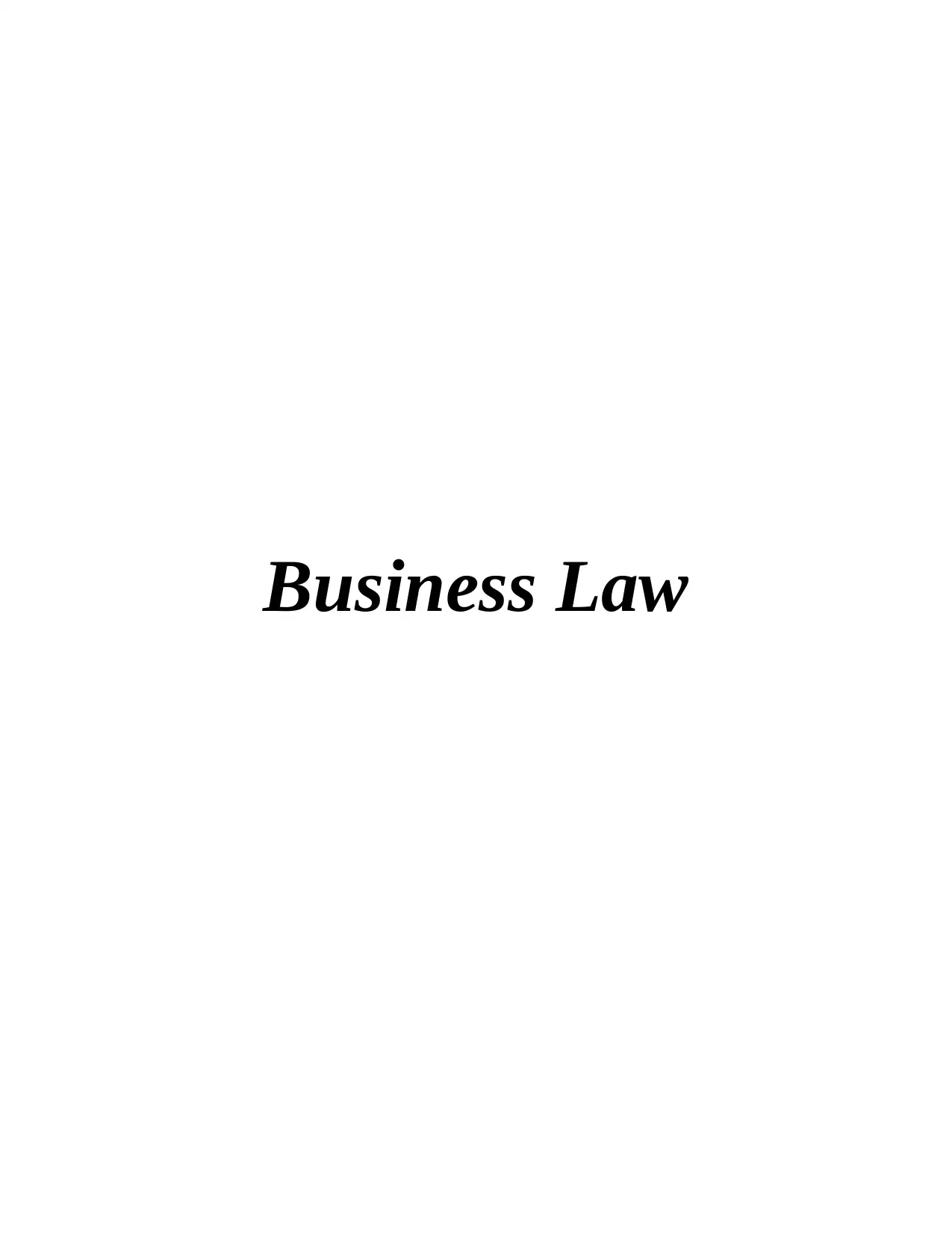
Business Law
Paraphrase This Document
Need a fresh take? Get an instant paraphrase of this document with our AI Paraphraser
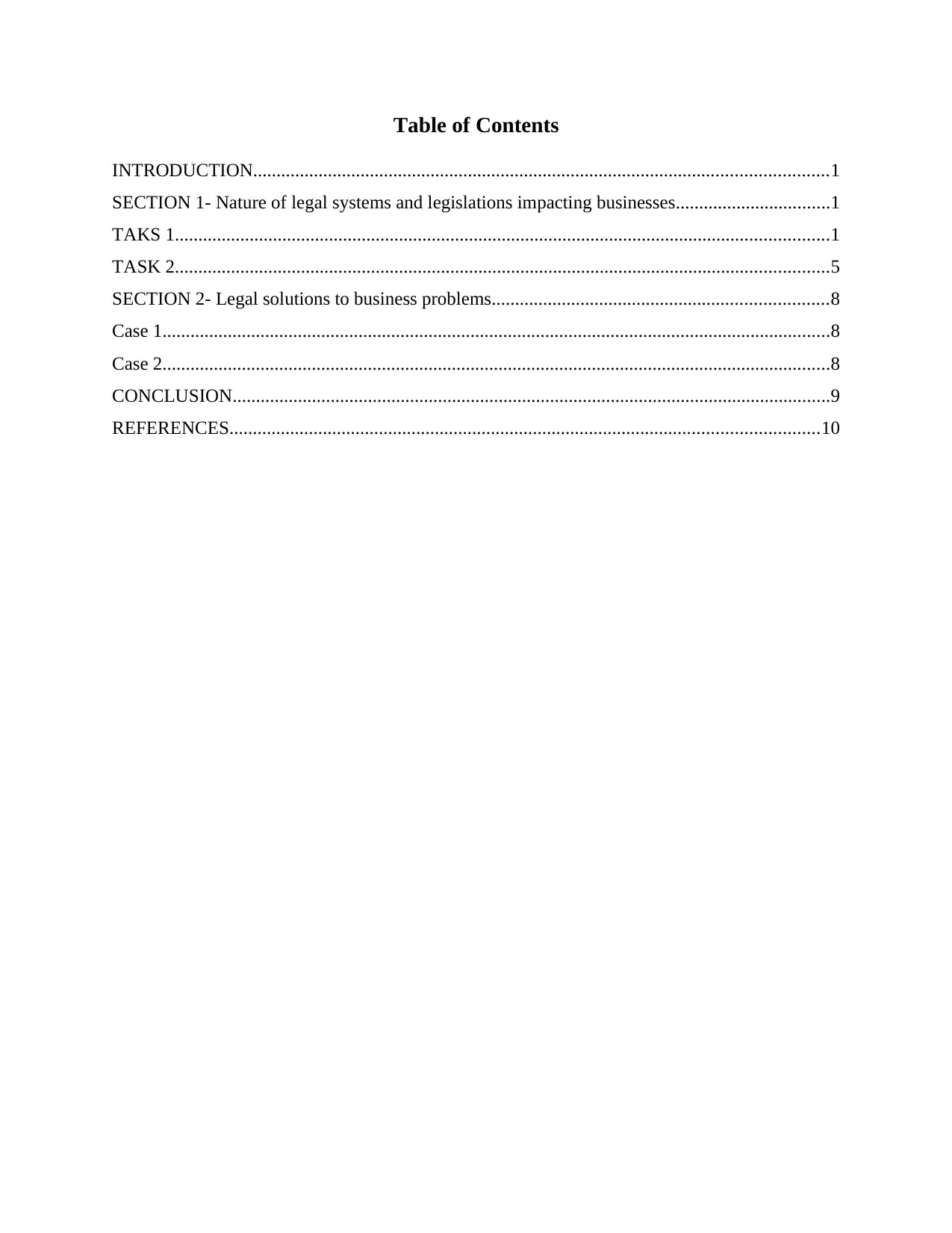
Table of Contents
INTRODUCTION...........................................................................................................................1
SECTION 1- Nature of legal systems and legislations impacting businesses.................................1
TAKS 1............................................................................................................................................1
TASK 2............................................................................................................................................5
SECTION 2- Legal solutions to business problems........................................................................8
Case 1...............................................................................................................................................8
Case 2...............................................................................................................................................8
CONCLUSION................................................................................................................................9
REFERENCES..............................................................................................................................10
INTRODUCTION...........................................................................................................................1
SECTION 1- Nature of legal systems and legislations impacting businesses.................................1
TAKS 1............................................................................................................................................1
TASK 2............................................................................................................................................5
SECTION 2- Legal solutions to business problems........................................................................8
Case 1...............................................................................................................................................8
Case 2...............................................................................................................................................8
CONCLUSION................................................................................................................................9
REFERENCES..............................................................................................................................10

⊘ This is a preview!⊘
Do you want full access?
Subscribe today to unlock all pages.

Trusted by 1+ million students worldwide
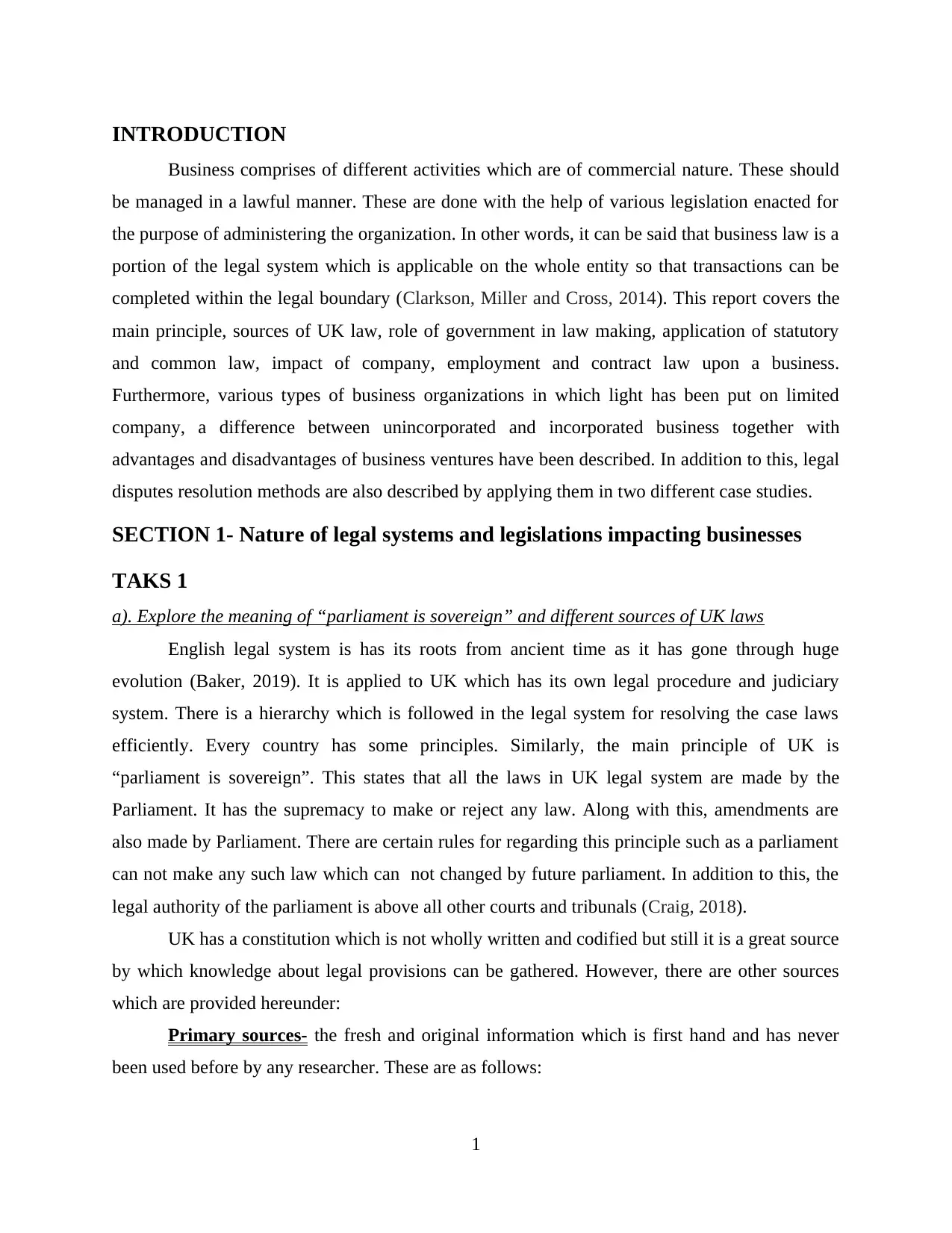
INTRODUCTION
Business comprises of different activities which are of commercial nature. These should
be managed in a lawful manner. These are done with the help of various legislation enacted for
the purpose of administering the organization. In other words, it can be said that business law is a
portion of the legal system which is applicable on the whole entity so that transactions can be
completed within the legal boundary (Clarkson, Miller and Cross, 2014). This report covers the
main principle, sources of UK law, role of government in law making, application of statutory
and common law, impact of company, employment and contract law upon a business.
Furthermore, various types of business organizations in which light has been put on limited
company, a difference between unincorporated and incorporated business together with
advantages and disadvantages of business ventures have been described. In addition to this, legal
disputes resolution methods are also described by applying them in two different case studies.
SECTION 1- Nature of legal systems and legislations impacting businesses
TAKS 1
a). Explore the meaning of “parliament is sovereign” and different sources of UK laws
English legal system is has its roots from ancient time as it has gone through huge
evolution (Baker, 2019). It is applied to UK which has its own legal procedure and judiciary
system. There is a hierarchy which is followed in the legal system for resolving the case laws
efficiently. Every country has some principles. Similarly, the main principle of UK is
“parliament is sovereign”. This states that all the laws in UK legal system are made by the
Parliament. It has the supremacy to make or reject any law. Along with this, amendments are
also made by Parliament. There are certain rules for regarding this principle such as a parliament
can not make any such law which can not changed by future parliament. In addition to this, the
legal authority of the parliament is above all other courts and tribunals (Craig, 2018).
UK has a constitution which is not wholly written and codified but still it is a great source
by which knowledge about legal provisions can be gathered. However, there are other sources
which are provided hereunder:
Primary sources- the fresh and original information which is first hand and has never
been used before by any researcher. These are as follows:
1
Business comprises of different activities which are of commercial nature. These should
be managed in a lawful manner. These are done with the help of various legislation enacted for
the purpose of administering the organization. In other words, it can be said that business law is a
portion of the legal system which is applicable on the whole entity so that transactions can be
completed within the legal boundary (Clarkson, Miller and Cross, 2014). This report covers the
main principle, sources of UK law, role of government in law making, application of statutory
and common law, impact of company, employment and contract law upon a business.
Furthermore, various types of business organizations in which light has been put on limited
company, a difference between unincorporated and incorporated business together with
advantages and disadvantages of business ventures have been described. In addition to this, legal
disputes resolution methods are also described by applying them in two different case studies.
SECTION 1- Nature of legal systems and legislations impacting businesses
TAKS 1
a). Explore the meaning of “parliament is sovereign” and different sources of UK laws
English legal system is has its roots from ancient time as it has gone through huge
evolution (Baker, 2019). It is applied to UK which has its own legal procedure and judiciary
system. There is a hierarchy which is followed in the legal system for resolving the case laws
efficiently. Every country has some principles. Similarly, the main principle of UK is
“parliament is sovereign”. This states that all the laws in UK legal system are made by the
Parliament. It has the supremacy to make or reject any law. Along with this, amendments are
also made by Parliament. There are certain rules for regarding this principle such as a parliament
can not make any such law which can not changed by future parliament. In addition to this, the
legal authority of the parliament is above all other courts and tribunals (Craig, 2018).
UK has a constitution which is not wholly written and codified but still it is a great source
by which knowledge about legal provisions can be gathered. However, there are other sources
which are provided hereunder:
Primary sources- the fresh and original information which is first hand and has never
been used before by any researcher. These are as follows:
1
Paraphrase This Document
Need a fresh take? Get an instant paraphrase of this document with our AI Paraphraser
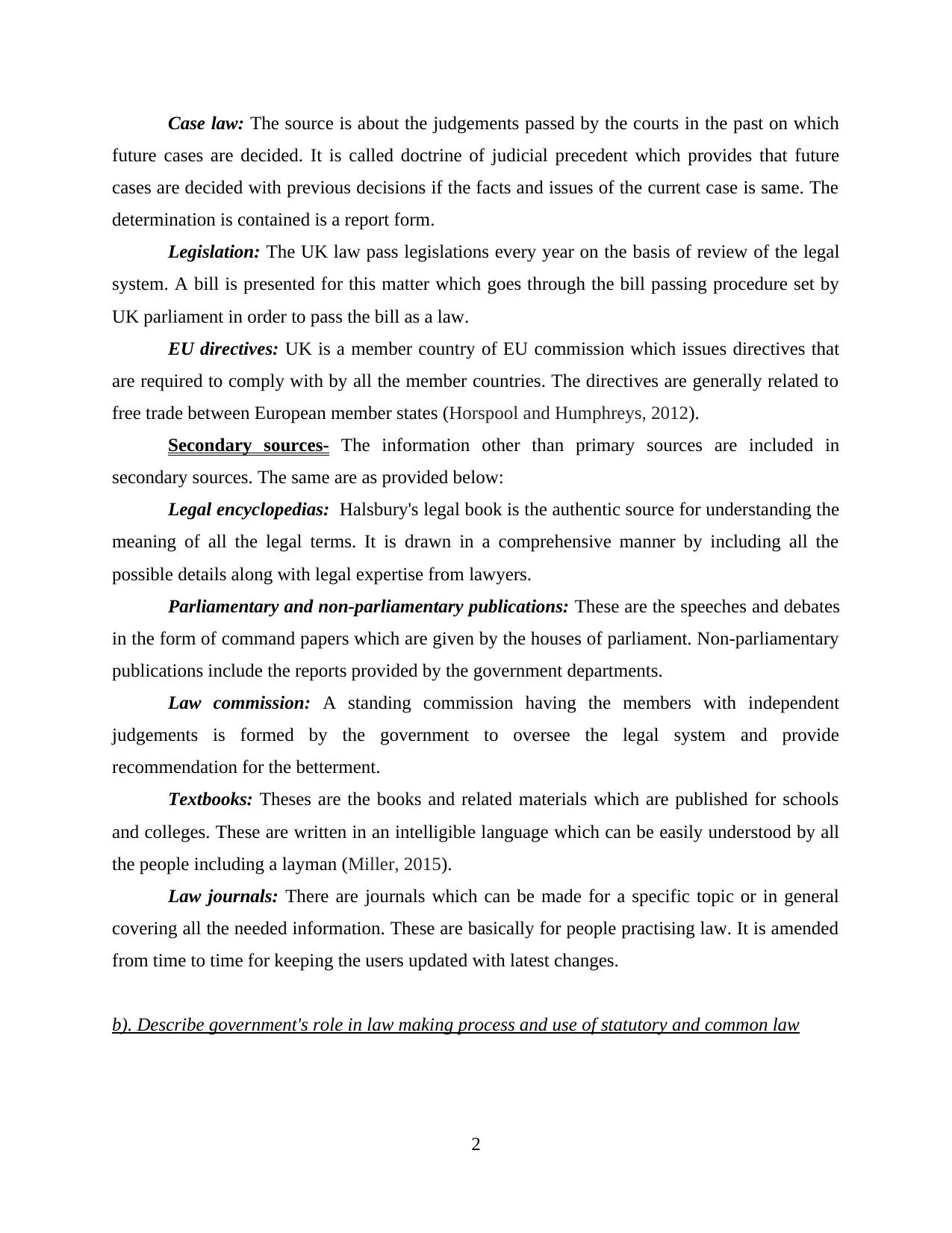
Case law: The source is about the judgements passed by the courts in the past on which
future cases are decided. It is called doctrine of judicial precedent which provides that future
cases are decided with previous decisions if the facts and issues of the current case is same. The
determination is contained is a report form.
Legislation: The UK law pass legislations every year on the basis of review of the legal
system. A bill is presented for this matter which goes through the bill passing procedure set by
UK parliament in order to pass the bill as a law.
EU directives: UK is a member country of EU commission which issues directives that
are required to comply with by all the member countries. The directives are generally related to
free trade between European member states (Horspool and Humphreys, 2012).
Secondary sources- The information other than primary sources are included in
secondary sources. The same are as provided below:
Legal encyclopedias: Halsbury's legal book is the authentic source for understanding the
meaning of all the legal terms. It is drawn in a comprehensive manner by including all the
possible details along with legal expertise from lawyers.
Parliamentary and non-parliamentary publications: These are the speeches and debates
in the form of command papers which are given by the houses of parliament. Non-parliamentary
publications include the reports provided by the government departments.
Law commission: A standing commission having the members with independent
judgements is formed by the government to oversee the legal system and provide
recommendation for the betterment.
Textbooks: Theses are the books and related materials which are published for schools
and colleges. These are written in an intelligible language which can be easily understood by all
the people including a layman (Miller, 2015).
Law journals: There are journals which can be made for a specific topic or in general
covering all the needed information. These are basically for people practising law. It is amended
from time to time for keeping the users updated with latest changes.
b). Describe government's role in law making process and use of statutory and common law
2
future cases are decided. It is called doctrine of judicial precedent which provides that future
cases are decided with previous decisions if the facts and issues of the current case is same. The
determination is contained is a report form.
Legislation: The UK law pass legislations every year on the basis of review of the legal
system. A bill is presented for this matter which goes through the bill passing procedure set by
UK parliament in order to pass the bill as a law.
EU directives: UK is a member country of EU commission which issues directives that
are required to comply with by all the member countries. The directives are generally related to
free trade between European member states (Horspool and Humphreys, 2012).
Secondary sources- The information other than primary sources are included in
secondary sources. The same are as provided below:
Legal encyclopedias: Halsbury's legal book is the authentic source for understanding the
meaning of all the legal terms. It is drawn in a comprehensive manner by including all the
possible details along with legal expertise from lawyers.
Parliamentary and non-parliamentary publications: These are the speeches and debates
in the form of command papers which are given by the houses of parliament. Non-parliamentary
publications include the reports provided by the government departments.
Law commission: A standing commission having the members with independent
judgements is formed by the government to oversee the legal system and provide
recommendation for the betterment.
Textbooks: Theses are the books and related materials which are published for schools
and colleges. These are written in an intelligible language which can be easily understood by all
the people including a layman (Miller, 2015).
Law journals: There are journals which can be made for a specific topic or in general
covering all the needed information. These are basically for people practising law. It is amended
from time to time for keeping the users updated with latest changes.
b). Describe government's role in law making process and use of statutory and common law
2
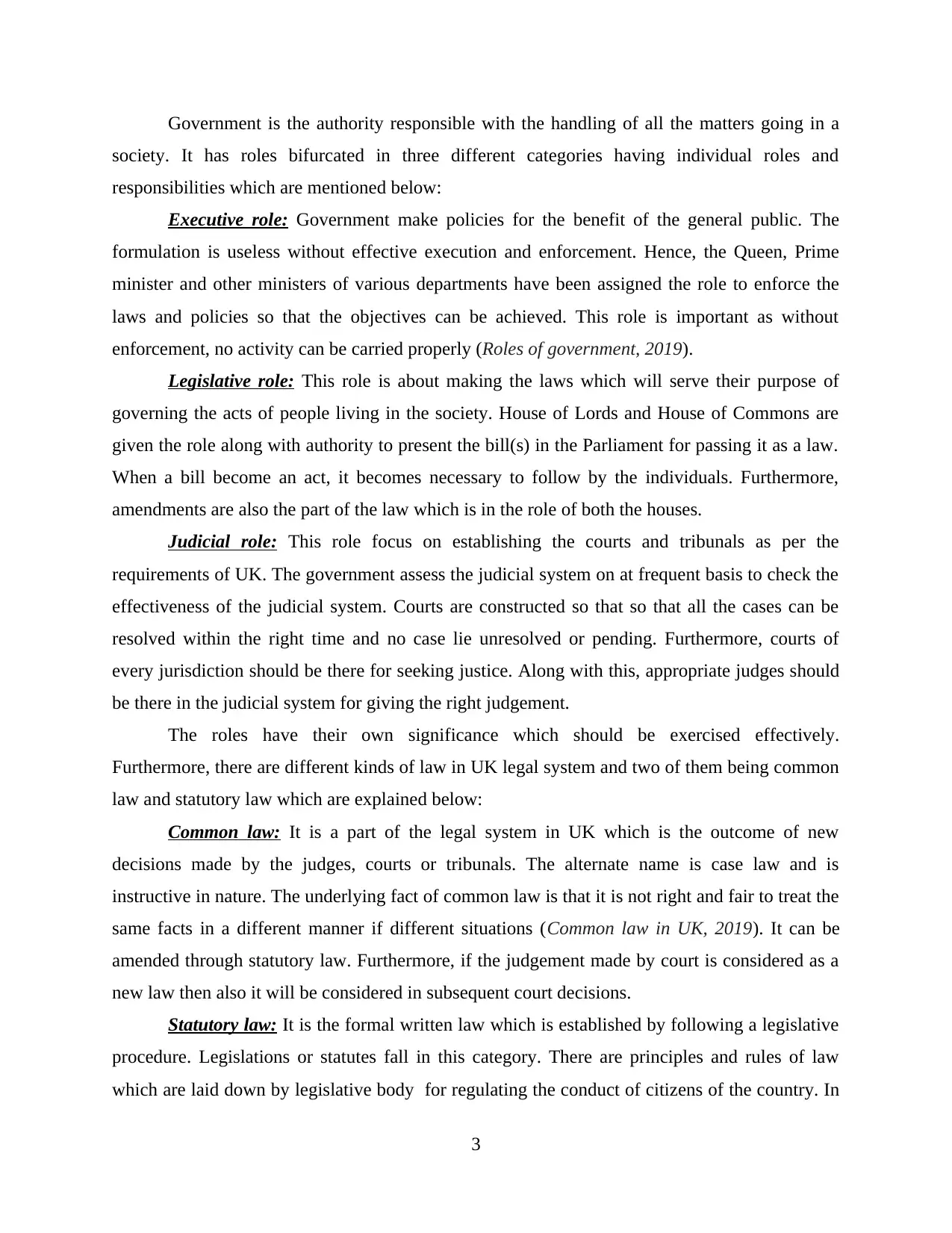
Government is the authority responsible with the handling of all the matters going in a
society. It has roles bifurcated in three different categories having individual roles and
responsibilities which are mentioned below:
Executive role: Government make policies for the benefit of the general public. The
formulation is useless without effective execution and enforcement. Hence, the Queen, Prime
minister and other ministers of various departments have been assigned the role to enforce the
laws and policies so that the objectives can be achieved. This role is important as without
enforcement, no activity can be carried properly (Roles of government, 2019).
Legislative role: This role is about making the laws which will serve their purpose of
governing the acts of people living in the society. House of Lords and House of Commons are
given the role along with authority to present the bill(s) in the Parliament for passing it as a law.
When a bill become an act, it becomes necessary to follow by the individuals. Furthermore,
amendments are also the part of the law which is in the role of both the houses.
Judicial role: This role focus on establishing the courts and tribunals as per the
requirements of UK. The government assess the judicial system on at frequent basis to check the
effectiveness of the judicial system. Courts are constructed so that so that all the cases can be
resolved within the right time and no case lie unresolved or pending. Furthermore, courts of
every jurisdiction should be there for seeking justice. Along with this, appropriate judges should
be there in the judicial system for giving the right judgement.
The roles have their own significance which should be exercised effectively.
Furthermore, there are different kinds of law in UK legal system and two of them being common
law and statutory law which are explained below:
Common law: It is a part of the legal system in UK which is the outcome of new
decisions made by the judges, courts or tribunals. The alternate name is case law and is
instructive in nature. The underlying fact of common law is that it is not right and fair to treat the
same facts in a different manner if different situations (Common law in UK, 2019). It can be
amended through statutory law. Furthermore, if the judgement made by court is considered as a
new law then also it will be considered in subsequent court decisions.
Statutory law: It is the formal written law which is established by following a legislative
procedure. Legislations or statutes fall in this category. There are principles and rules of law
which are laid down by legislative body for regulating the conduct of citizens of the country. In
3
society. It has roles bifurcated in three different categories having individual roles and
responsibilities which are mentioned below:
Executive role: Government make policies for the benefit of the general public. The
formulation is useless without effective execution and enforcement. Hence, the Queen, Prime
minister and other ministers of various departments have been assigned the role to enforce the
laws and policies so that the objectives can be achieved. This role is important as without
enforcement, no activity can be carried properly (Roles of government, 2019).
Legislative role: This role is about making the laws which will serve their purpose of
governing the acts of people living in the society. House of Lords and House of Commons are
given the role along with authority to present the bill(s) in the Parliament for passing it as a law.
When a bill become an act, it becomes necessary to follow by the individuals. Furthermore,
amendments are also the part of the law which is in the role of both the houses.
Judicial role: This role focus on establishing the courts and tribunals as per the
requirements of UK. The government assess the judicial system on at frequent basis to check the
effectiveness of the judicial system. Courts are constructed so that so that all the cases can be
resolved within the right time and no case lie unresolved or pending. Furthermore, courts of
every jurisdiction should be there for seeking justice. Along with this, appropriate judges should
be there in the judicial system for giving the right judgement.
The roles have their own significance which should be exercised effectively.
Furthermore, there are different kinds of law in UK legal system and two of them being common
law and statutory law which are explained below:
Common law: It is a part of the legal system in UK which is the outcome of new
decisions made by the judges, courts or tribunals. The alternate name is case law and is
instructive in nature. The underlying fact of common law is that it is not right and fair to treat the
same facts in a different manner if different situations (Common law in UK, 2019). It can be
amended through statutory law. Furthermore, if the judgement made by court is considered as a
new law then also it will be considered in subsequent court decisions.
Statutory law: It is the formal written law which is established by following a legislative
procedure. Legislations or statutes fall in this category. There are principles and rules of law
which are laid down by legislative body for regulating the conduct of citizens of the country. In
3
⊘ This is a preview!⊘
Do you want full access?
Subscribe today to unlock all pages.

Trusted by 1+ million students worldwide
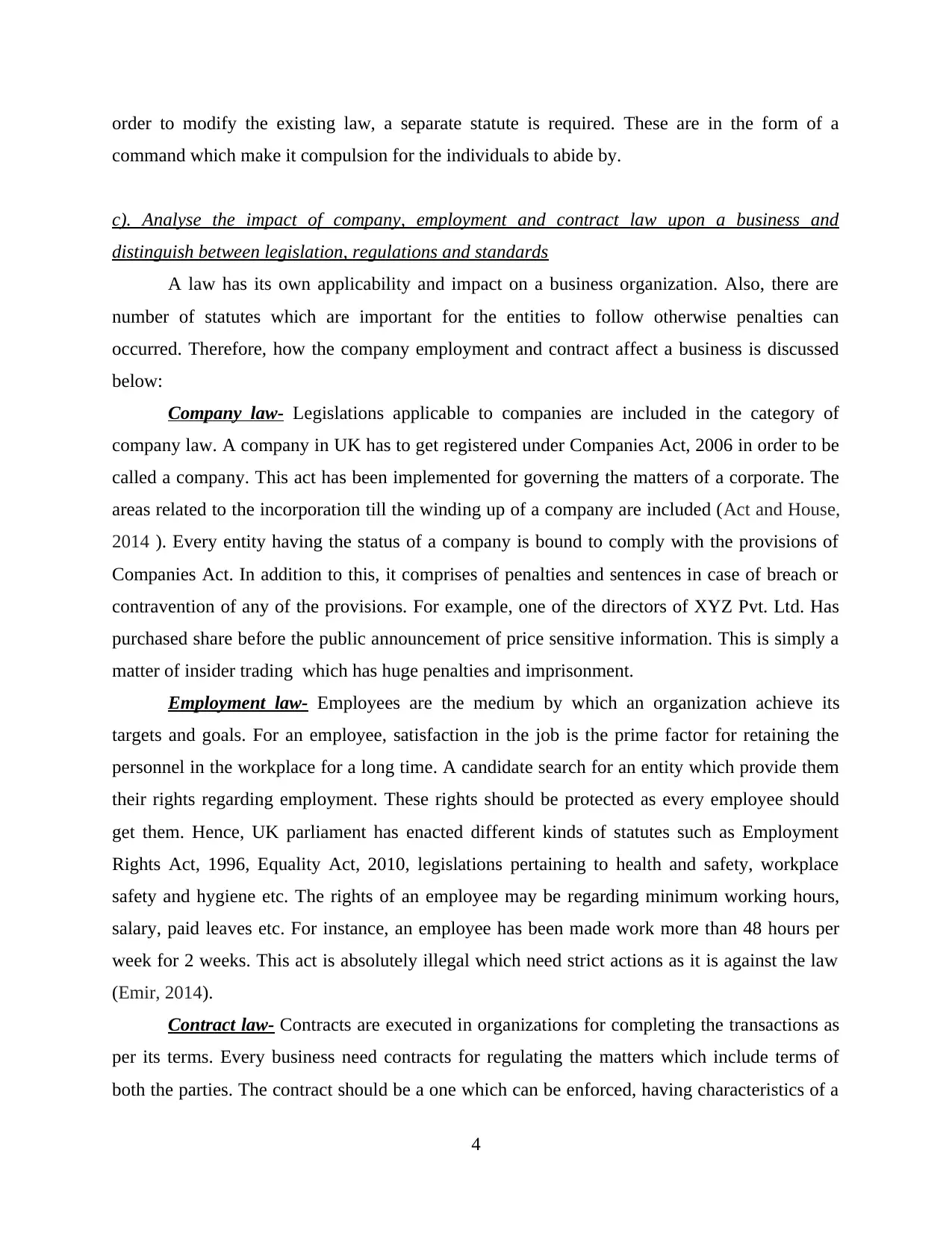
order to modify the existing law, a separate statute is required. These are in the form of a
command which make it compulsion for the individuals to abide by.
c). Analyse the impact of company, employment and contract law upon a business and
distinguish between legislation, regulations and standards
A law has its own applicability and impact on a business organization. Also, there are
number of statutes which are important for the entities to follow otherwise penalties can
occurred. Therefore, how the company employment and contract affect a business is discussed
below:
Company law- Legislations applicable to companies are included in the category of
company law. A company in UK has to get registered under Companies Act, 2006 in order to be
called a company. This act has been implemented for governing the matters of a corporate. The
areas related to the incorporation till the winding up of a company are included (Act and House,
2014 ). Every entity having the status of a company is bound to comply with the provisions of
Companies Act. In addition to this, it comprises of penalties and sentences in case of breach or
contravention of any of the provisions. For example, one of the directors of XYZ Pvt. Ltd. Has
purchased share before the public announcement of price sensitive information. This is simply a
matter of insider trading which has huge penalties and imprisonment.
Employment law- Employees are the medium by which an organization achieve its
targets and goals. For an employee, satisfaction in the job is the prime factor for retaining the
personnel in the workplace for a long time. A candidate search for an entity which provide them
their rights regarding employment. These rights should be protected as every employee should
get them. Hence, UK parliament has enacted different kinds of statutes such as Employment
Rights Act, 1996, Equality Act, 2010, legislations pertaining to health and safety, workplace
safety and hygiene etc. The rights of an employee may be regarding minimum working hours,
salary, paid leaves etc. For instance, an employee has been made work more than 48 hours per
week for 2 weeks. This act is absolutely illegal which need strict actions as it is against the law
(Emir, 2014).
Contract law- Contracts are executed in organizations for completing the transactions as
per its terms. Every business need contracts for regulating the matters which include terms of
both the parties. The contract should be a one which can be enforced, having characteristics of a
4
command which make it compulsion for the individuals to abide by.
c). Analyse the impact of company, employment and contract law upon a business and
distinguish between legislation, regulations and standards
A law has its own applicability and impact on a business organization. Also, there are
number of statutes which are important for the entities to follow otherwise penalties can
occurred. Therefore, how the company employment and contract affect a business is discussed
below:
Company law- Legislations applicable to companies are included in the category of
company law. A company in UK has to get registered under Companies Act, 2006 in order to be
called a company. This act has been implemented for governing the matters of a corporate. The
areas related to the incorporation till the winding up of a company are included (Act and House,
2014 ). Every entity having the status of a company is bound to comply with the provisions of
Companies Act. In addition to this, it comprises of penalties and sentences in case of breach or
contravention of any of the provisions. For example, one of the directors of XYZ Pvt. Ltd. Has
purchased share before the public announcement of price sensitive information. This is simply a
matter of insider trading which has huge penalties and imprisonment.
Employment law- Employees are the medium by which an organization achieve its
targets and goals. For an employee, satisfaction in the job is the prime factor for retaining the
personnel in the workplace for a long time. A candidate search for an entity which provide them
their rights regarding employment. These rights should be protected as every employee should
get them. Hence, UK parliament has enacted different kinds of statutes such as Employment
Rights Act, 1996, Equality Act, 2010, legislations pertaining to health and safety, workplace
safety and hygiene etc. The rights of an employee may be regarding minimum working hours,
salary, paid leaves etc. For instance, an employee has been made work more than 48 hours per
week for 2 weeks. This act is absolutely illegal which need strict actions as it is against the law
(Emir, 2014).
Contract law- Contracts are executed in organizations for completing the transactions as
per its terms. Every business need contracts for regulating the matters which include terms of
both the parties. The contract should be a one which can be enforced, having characteristics of a
4
Paraphrase This Document
Need a fresh take? Get an instant paraphrase of this document with our AI Paraphraser
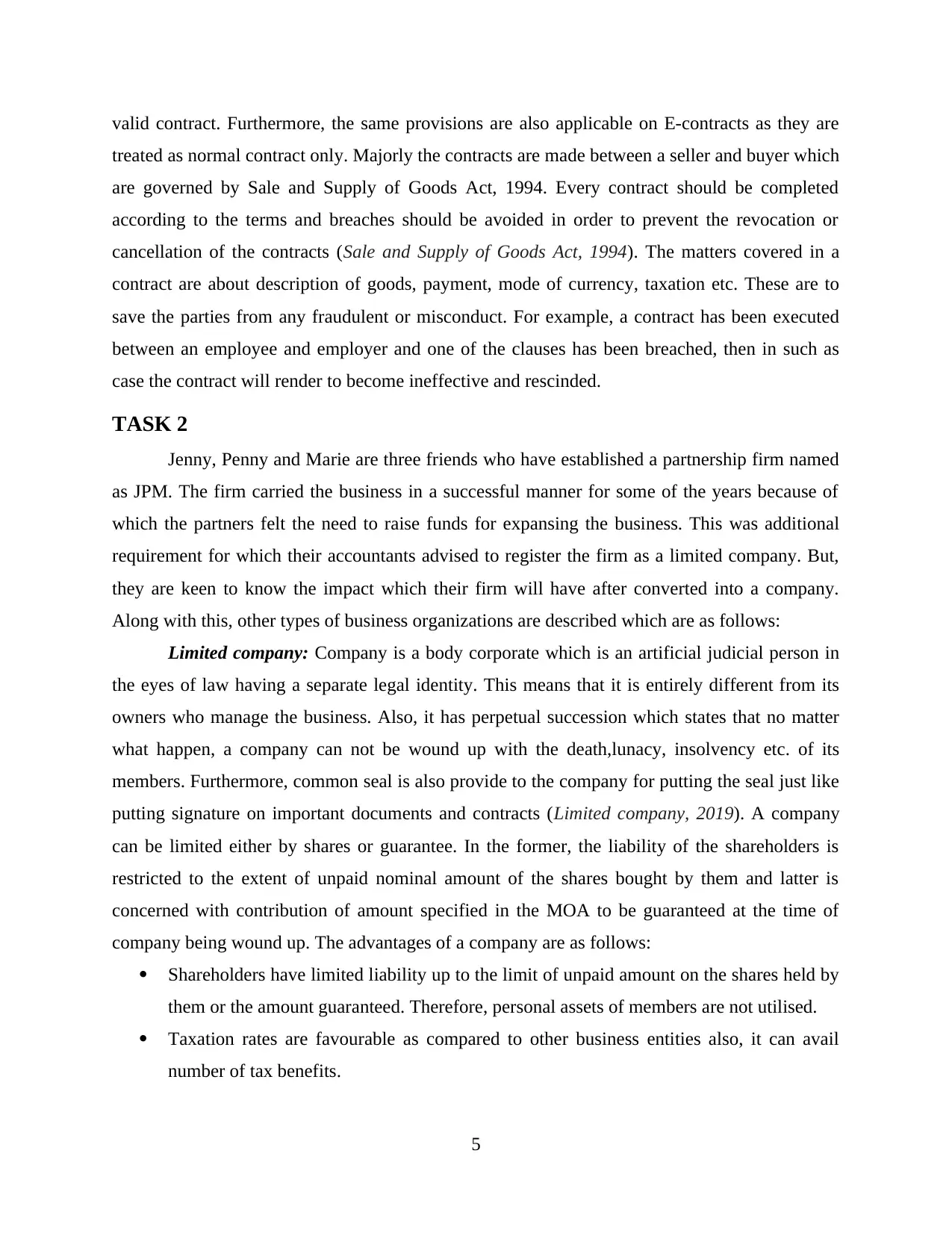
valid contract. Furthermore, the same provisions are also applicable on E-contracts as they are
treated as normal contract only. Majorly the contracts are made between a seller and buyer which
are governed by Sale and Supply of Goods Act, 1994. Every contract should be completed
according to the terms and breaches should be avoided in order to prevent the revocation or
cancellation of the contracts (Sale and Supply of Goods Act, 1994). The matters covered in a
contract are about description of goods, payment, mode of currency, taxation etc. These are to
save the parties from any fraudulent or misconduct. For example, a contract has been executed
between an employee and employer and one of the clauses has been breached, then in such as
case the contract will render to become ineffective and rescinded.
TASK 2
Jenny, Penny and Marie are three friends who have established a partnership firm named
as JPM. The firm carried the business in a successful manner for some of the years because of
which the partners felt the need to raise funds for expansing the business. This was additional
requirement for which their accountants advised to register the firm as a limited company. But,
they are keen to know the impact which their firm will have after converted into a company.
Along with this, other types of business organizations are described which are as follows:
Limited company: Company is a body corporate which is an artificial judicial person in
the eyes of law having a separate legal identity. This means that it is entirely different from its
owners who manage the business. Also, it has perpetual succession which states that no matter
what happen, a company can not be wound up with the death,lunacy, insolvency etc. of its
members. Furthermore, common seal is also provide to the company for putting the seal just like
putting signature on important documents and contracts (Limited company, 2019). A company
can be limited either by shares or guarantee. In the former, the liability of the shareholders is
restricted to the extent of unpaid nominal amount of the shares bought by them and latter is
concerned with contribution of amount specified in the MOA to be guaranteed at the time of
company being wound up. The advantages of a company are as follows:
Shareholders have limited liability up to the limit of unpaid amount on the shares held by
them or the amount guaranteed. Therefore, personal assets of members are not utilised.
Taxation rates are favourable as compared to other business entities also, it can avail
number of tax benefits.
5
treated as normal contract only. Majorly the contracts are made between a seller and buyer which
are governed by Sale and Supply of Goods Act, 1994. Every contract should be completed
according to the terms and breaches should be avoided in order to prevent the revocation or
cancellation of the contracts (Sale and Supply of Goods Act, 1994). The matters covered in a
contract are about description of goods, payment, mode of currency, taxation etc. These are to
save the parties from any fraudulent or misconduct. For example, a contract has been executed
between an employee and employer and one of the clauses has been breached, then in such as
case the contract will render to become ineffective and rescinded.
TASK 2
Jenny, Penny and Marie are three friends who have established a partnership firm named
as JPM. The firm carried the business in a successful manner for some of the years because of
which the partners felt the need to raise funds for expansing the business. This was additional
requirement for which their accountants advised to register the firm as a limited company. But,
they are keen to know the impact which their firm will have after converted into a company.
Along with this, other types of business organizations are described which are as follows:
Limited company: Company is a body corporate which is an artificial judicial person in
the eyes of law having a separate legal identity. This means that it is entirely different from its
owners who manage the business. Also, it has perpetual succession which states that no matter
what happen, a company can not be wound up with the death,lunacy, insolvency etc. of its
members. Furthermore, common seal is also provide to the company for putting the seal just like
putting signature on important documents and contracts (Limited company, 2019). A company
can be limited either by shares or guarantee. In the former, the liability of the shareholders is
restricted to the extent of unpaid nominal amount of the shares bought by them and latter is
concerned with contribution of amount specified in the MOA to be guaranteed at the time of
company being wound up. The advantages of a company are as follows:
Shareholders have limited liability up to the limit of unpaid amount on the shares held by
them or the amount guaranteed. Therefore, personal assets of members are not utilised.
Taxation rates are favourable as compared to other business entities also, it can avail
number of tax benefits.
5
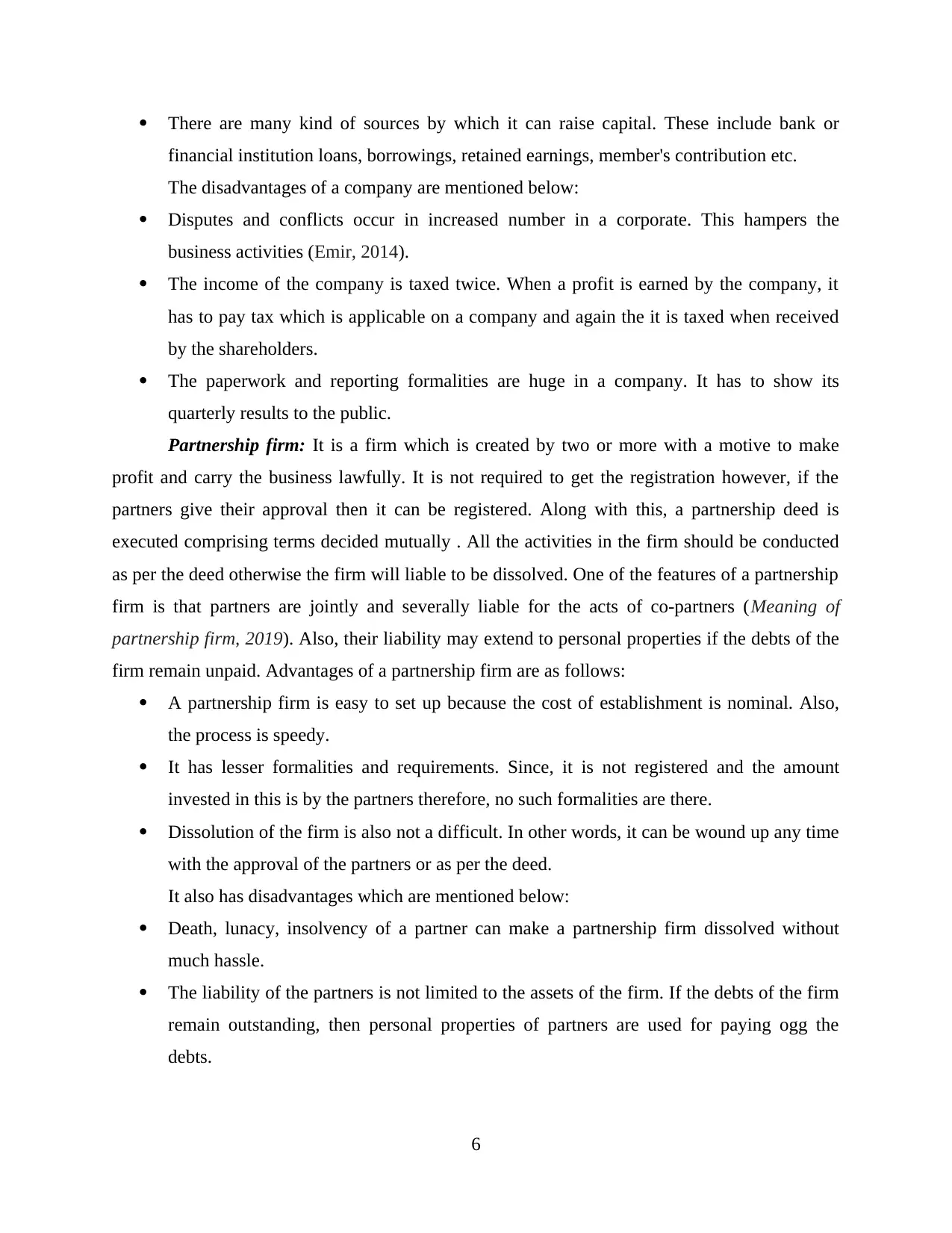
There are many kind of sources by which it can raise capital. These include bank or
financial institution loans, borrowings, retained earnings, member's contribution etc.
The disadvantages of a company are mentioned below:
Disputes and conflicts occur in increased number in a corporate. This hampers the
business activities (Emir, 2014).
The income of the company is taxed twice. When a profit is earned by the company, it
has to pay tax which is applicable on a company and again the it is taxed when received
by the shareholders.
The paperwork and reporting formalities are huge in a company. It has to show its
quarterly results to the public.
Partnership firm: It is a firm which is created by two or more with a motive to make
profit and carry the business lawfully. It is not required to get the registration however, if the
partners give their approval then it can be registered. Along with this, a partnership deed is
executed comprising terms decided mutually . All the activities in the firm should be conducted
as per the deed otherwise the firm will liable to be dissolved. One of the features of a partnership
firm is that partners are jointly and severally liable for the acts of co-partners (Meaning of
partnership firm, 2019). Also, their liability may extend to personal properties if the debts of the
firm remain unpaid. Advantages of a partnership firm are as follows:
A partnership firm is easy to set up because the cost of establishment is nominal. Also,
the process is speedy.
It has lesser formalities and requirements. Since, it is not registered and the amount
invested in this is by the partners therefore, no such formalities are there.
Dissolution of the firm is also not a difficult. In other words, it can be wound up any time
with the approval of the partners or as per the deed.
It also has disadvantages which are mentioned below:
Death, lunacy, insolvency of a partner can make a partnership firm dissolved without
much hassle.
The liability of the partners is not limited to the assets of the firm. If the debts of the firm
remain outstanding, then personal properties of partners are used for paying ogg the
debts.
6
financial institution loans, borrowings, retained earnings, member's contribution etc.
The disadvantages of a company are mentioned below:
Disputes and conflicts occur in increased number in a corporate. This hampers the
business activities (Emir, 2014).
The income of the company is taxed twice. When a profit is earned by the company, it
has to pay tax which is applicable on a company and again the it is taxed when received
by the shareholders.
The paperwork and reporting formalities are huge in a company. It has to show its
quarterly results to the public.
Partnership firm: It is a firm which is created by two or more with a motive to make
profit and carry the business lawfully. It is not required to get the registration however, if the
partners give their approval then it can be registered. Along with this, a partnership deed is
executed comprising terms decided mutually . All the activities in the firm should be conducted
as per the deed otherwise the firm will liable to be dissolved. One of the features of a partnership
firm is that partners are jointly and severally liable for the acts of co-partners (Meaning of
partnership firm, 2019). Also, their liability may extend to personal properties if the debts of the
firm remain unpaid. Advantages of a partnership firm are as follows:
A partnership firm is easy to set up because the cost of establishment is nominal. Also,
the process is speedy.
It has lesser formalities and requirements. Since, it is not registered and the amount
invested in this is by the partners therefore, no such formalities are there.
Dissolution of the firm is also not a difficult. In other words, it can be wound up any time
with the approval of the partners or as per the deed.
It also has disadvantages which are mentioned below:
Death, lunacy, insolvency of a partner can make a partnership firm dissolved without
much hassle.
The liability of the partners is not limited to the assets of the firm. If the debts of the firm
remain outstanding, then personal properties of partners are used for paying ogg the
debts.
6
⊘ This is a preview!⊘
Do you want full access?
Subscribe today to unlock all pages.

Trusted by 1+ million students worldwide

There may arise some situations reflecting unequal distribution of powers. This may give
birth to disputes between the partners.
Sole proprietorship: A single person manages the business of a sole proprietorship
because it is generally established in a small business. There is no compulsion of registration as
it can operate with the name of the owner. Owner is also called sole trader or sole proprietor who
holds the decision making power. Furthermore, he can hire members from his family or outside
the family for providing a helping hand in the daily activities. It is simple form entity with no
legal or financial formalities (De Massis, Kotlar and Frattini, 2013). It can be set up easily
without any struggle. Investors are rarely interested in investing in this type of business because
it is not a registered entity. Therefore, the sources of funds are personal savings and loan from
banks or financial institutions. The existence of the entity is till the owner is alive or solvent. In
other words, a sole proprietorship gets dissolved with the death, insolvency or lunacy of the
owner.
Limited Liability Partnership (LLP): The entity is established by mixing the
characteristics of a company and partnership. The structure in terms of partners is similar to that
of a partnership firm but their liability is limited and does not exceed to their personal assets.
Furthermore, partners have flexibility in exercising their powers and rights in respect to the
management. It is suitable for those individuals who are looking for business organization in
which they can work according to their flexibility without incurring liabilities (Segal and Choi,
2016). Therefore, this entity is often chosen by people in the fields of advocacy, company
secretaryship, chartered accountancy etc. It has greater options to raise funds from which
includes partners' capital, retained earnings, personal savings, venture capital, crowdfunding,
bank loan, financial institution loans etc.
The above-mentioned are the types of organizations which can be chosen by a person for
starting the business. However, a business can be incorporated or incorporated. The difference
between the same has been explained below:
Basis Unincorporated business Incorporated business
7
birth to disputes between the partners.
Sole proprietorship: A single person manages the business of a sole proprietorship
because it is generally established in a small business. There is no compulsion of registration as
it can operate with the name of the owner. Owner is also called sole trader or sole proprietor who
holds the decision making power. Furthermore, he can hire members from his family or outside
the family for providing a helping hand in the daily activities. It is simple form entity with no
legal or financial formalities (De Massis, Kotlar and Frattini, 2013). It can be set up easily
without any struggle. Investors are rarely interested in investing in this type of business because
it is not a registered entity. Therefore, the sources of funds are personal savings and loan from
banks or financial institutions. The existence of the entity is till the owner is alive or solvent. In
other words, a sole proprietorship gets dissolved with the death, insolvency or lunacy of the
owner.
Limited Liability Partnership (LLP): The entity is established by mixing the
characteristics of a company and partnership. The structure in terms of partners is similar to that
of a partnership firm but their liability is limited and does not exceed to their personal assets.
Furthermore, partners have flexibility in exercising their powers and rights in respect to the
management. It is suitable for those individuals who are looking for business organization in
which they can work according to their flexibility without incurring liabilities (Segal and Choi,
2016). Therefore, this entity is often chosen by people in the fields of advocacy, company
secretaryship, chartered accountancy etc. It has greater options to raise funds from which
includes partners' capital, retained earnings, personal savings, venture capital, crowdfunding,
bank loan, financial institution loans etc.
The above-mentioned are the types of organizations which can be chosen by a person for
starting the business. However, a business can be incorporated or incorporated. The difference
between the same has been explained below:
Basis Unincorporated business Incorporated business
7
Paraphrase This Document
Need a fresh take? Get an instant paraphrase of this document with our AI Paraphraser
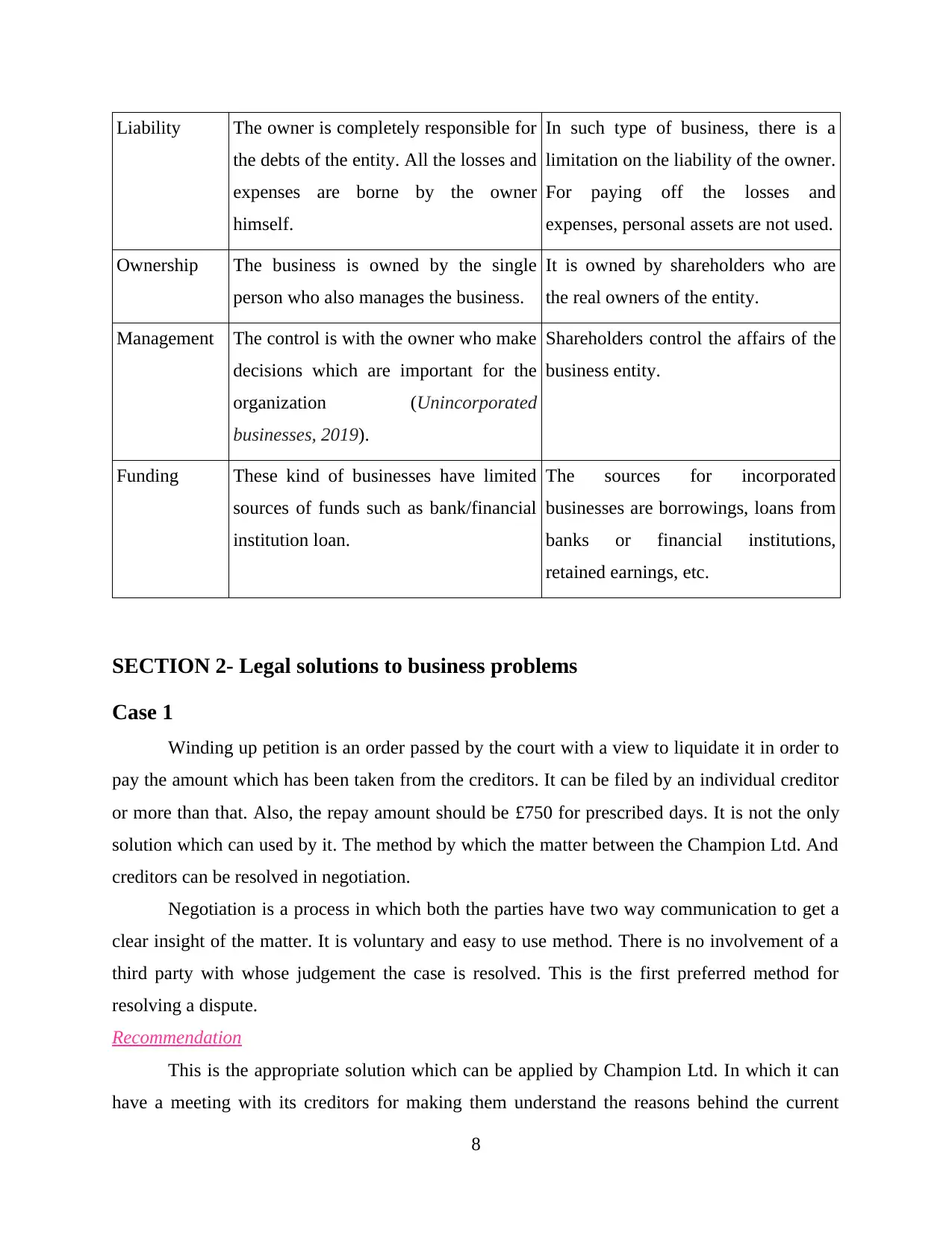
Liability The owner is completely responsible for
the debts of the entity. All the losses and
expenses are borne by the owner
himself.
In such type of business, there is a
limitation on the liability of the owner.
For paying off the losses and
expenses, personal assets are not used.
Ownership The business is owned by the single
person who also manages the business.
It is owned by shareholders who are
the real owners of the entity.
Management The control is with the owner who make
decisions which are important for the
organization (Unincorporated
businesses, 2019).
Shareholders control the affairs of the
business entity.
Funding These kind of businesses have limited
sources of funds such as bank/financial
institution loan.
The sources for incorporated
businesses are borrowings, loans from
banks or financial institutions,
retained earnings, etc.
SECTION 2- Legal solutions to business problems
Case 1
Winding up petition is an order passed by the court with a view to liquidate it in order to
pay the amount which has been taken from the creditors. It can be filed by an individual creditor
or more than that. Also, the repay amount should be £750 for prescribed days. It is not the only
solution which can used by it. The method by which the matter between the Champion Ltd. And
creditors can be resolved in negotiation.
Negotiation is a process in which both the parties have two way communication to get a
clear insight of the matter. It is voluntary and easy to use method. There is no involvement of a
third party with whose judgement the case is resolved. This is the first preferred method for
resolving a dispute.
Recommendation
This is the appropriate solution which can be applied by Champion Ltd. In which it can
have a meeting with its creditors for making them understand the reasons behind the current
8
the debts of the entity. All the losses and
expenses are borne by the owner
himself.
In such type of business, there is a
limitation on the liability of the owner.
For paying off the losses and
expenses, personal assets are not used.
Ownership The business is owned by the single
person who also manages the business.
It is owned by shareholders who are
the real owners of the entity.
Management The control is with the owner who make
decisions which are important for the
organization (Unincorporated
businesses, 2019).
Shareholders control the affairs of the
business entity.
Funding These kind of businesses have limited
sources of funds such as bank/financial
institution loan.
The sources for incorporated
businesses are borrowings, loans from
banks or financial institutions,
retained earnings, etc.
SECTION 2- Legal solutions to business problems
Case 1
Winding up petition is an order passed by the court with a view to liquidate it in order to
pay the amount which has been taken from the creditors. It can be filed by an individual creditor
or more than that. Also, the repay amount should be £750 for prescribed days. It is not the only
solution which can used by it. The method by which the matter between the Champion Ltd. And
creditors can be resolved in negotiation.
Negotiation is a process in which both the parties have two way communication to get a
clear insight of the matter. It is voluntary and easy to use method. There is no involvement of a
third party with whose judgement the case is resolved. This is the first preferred method for
resolving a dispute.
Recommendation
This is the appropriate solution which can be applied by Champion Ltd. In which it can
have a meeting with its creditors for making them understand the reasons behind the current
8
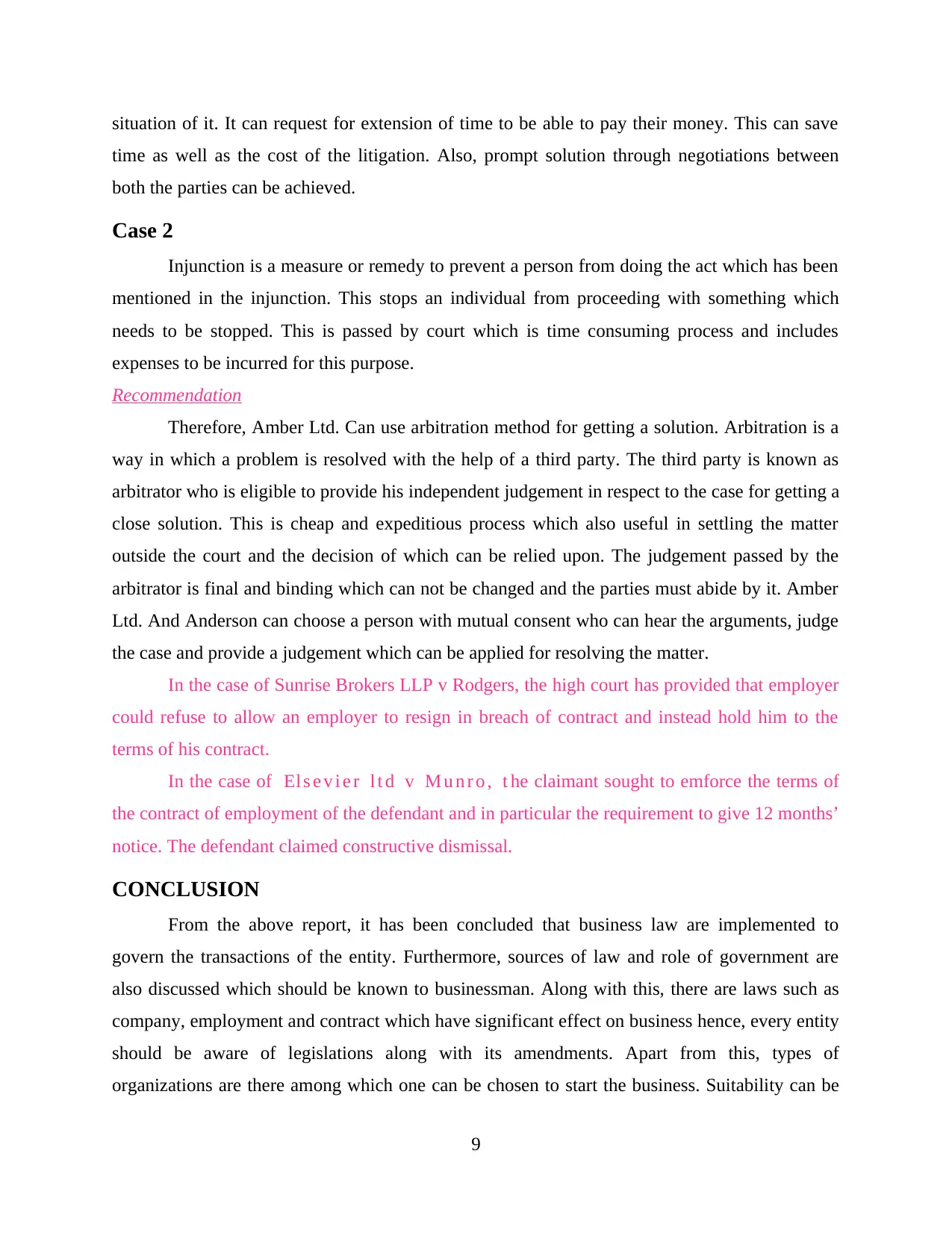
situation of it. It can request for extension of time to be able to pay their money. This can save
time as well as the cost of the litigation. Also, prompt solution through negotiations between
both the parties can be achieved.
Case 2
Injunction is a measure or remedy to prevent a person from doing the act which has been
mentioned in the injunction. This stops an individual from proceeding with something which
needs to be stopped. This is passed by court which is time consuming process and includes
expenses to be incurred for this purpose.
Recommendation
Therefore, Amber Ltd. Can use arbitration method for getting a solution. Arbitration is a
way in which a problem is resolved with the help of a third party. The third party is known as
arbitrator who is eligible to provide his independent judgement in respect to the case for getting a
close solution. This is cheap and expeditious process which also useful in settling the matter
outside the court and the decision of which can be relied upon. The judgement passed by the
arbitrator is final and binding which can not be changed and the parties must abide by it. Amber
Ltd. And Anderson can choose a person with mutual consent who can hear the arguments, judge
the case and provide a judgement which can be applied for resolving the matter.
In the case of Sunrise Brokers LLP v Rodgers, the high court has provided that employer
could refuse to allow an employer to resign in breach of contract and instead hold him to the
terms of his contract.
In the case of El s e v i e r l t d v M u n r o , t he claimant sought to emforce the terms of
the contract of employment of the defendant and in particular the requirement to give 12 months’
notice. The defendant claimed constructive dismissal.
CONCLUSION
From the above report, it has been concluded that business law are implemented to
govern the transactions of the entity. Furthermore, sources of law and role of government are
also discussed which should be known to businessman. Along with this, there are laws such as
company, employment and contract which have significant effect on business hence, every entity
should be aware of legislations along with its amendments. Apart from this, types of
organizations are there among which one can be chosen to start the business. Suitability can be
9
time as well as the cost of the litigation. Also, prompt solution through negotiations between
both the parties can be achieved.
Case 2
Injunction is a measure or remedy to prevent a person from doing the act which has been
mentioned in the injunction. This stops an individual from proceeding with something which
needs to be stopped. This is passed by court which is time consuming process and includes
expenses to be incurred for this purpose.
Recommendation
Therefore, Amber Ltd. Can use arbitration method for getting a solution. Arbitration is a
way in which a problem is resolved with the help of a third party. The third party is known as
arbitrator who is eligible to provide his independent judgement in respect to the case for getting a
close solution. This is cheap and expeditious process which also useful in settling the matter
outside the court and the decision of which can be relied upon. The judgement passed by the
arbitrator is final and binding which can not be changed and the parties must abide by it. Amber
Ltd. And Anderson can choose a person with mutual consent who can hear the arguments, judge
the case and provide a judgement which can be applied for resolving the matter.
In the case of Sunrise Brokers LLP v Rodgers, the high court has provided that employer
could refuse to allow an employer to resign in breach of contract and instead hold him to the
terms of his contract.
In the case of El s e v i e r l t d v M u n r o , t he claimant sought to emforce the terms of
the contract of employment of the defendant and in particular the requirement to give 12 months’
notice. The defendant claimed constructive dismissal.
CONCLUSION
From the above report, it has been concluded that business law are implemented to
govern the transactions of the entity. Furthermore, sources of law and role of government are
also discussed which should be known to businessman. Along with this, there are laws such as
company, employment and contract which have significant effect on business hence, every entity
should be aware of legislations along with its amendments. Apart from this, types of
organizations are there among which one can be chosen to start the business. Suitability can be
9
⊘ This is a preview!⊘
Do you want full access?
Subscribe today to unlock all pages.

Trusted by 1+ million students worldwide
1 out of 14
Related Documents
Your All-in-One AI-Powered Toolkit for Academic Success.
+13062052269
info@desklib.com
Available 24*7 on WhatsApp / Email
![[object Object]](/_next/static/media/star-bottom.7253800d.svg)
Unlock your academic potential
Copyright © 2020–2026 A2Z Services. All Rights Reserved. Developed and managed by ZUCOL.


